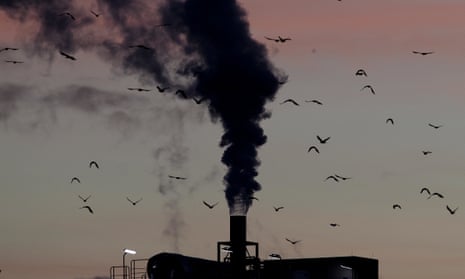Governments need to ramp up investment in nature restoration and raise the tax burden on companies that degrade wildlife, according to recommendations made to the G7 group of rich nations.
The proposals are part of a growing debate on how to radically change humanity’s relationship with nature in the wake of a new UN mega-report that showed an alarming decline in the Earth’s life-support systems.
They were presented by the Organisation for Economic Cooperation and Development (OECD) at the meeting this weekend in Metz, France, of environment ministers from the G7 nations – the US, Germany, Japan, the UK, Canada, France and Italy – along with observers including India, Indonesia, Mexico and Egypt.
The head of the OECD, Angel Gurría, told the gathering the world was heading for catastrophe as a result of the degradation of nature and needed a new culture that “respects nature and life”.
He pointed out that environment-related taxes currently accounted for only 1.6% of global economic output. And only a hundredth of that fraction generated revenue for biodiversity.
“It’s microscopic,” said Gurría. “So what our tax policies essentially tell us is that we do not care about biodiversity. There is potential to scale these up, while also protecting the poorest and most vulnerable from their effects.”
The balance of incentives also needs to shift, according to the OECD report he unveiled, which found that finance flows for biodiversity may be as little as $50bn (£38bn) a year, which is just a tenth of the subsidies paid to fossil fuel companies and agribusiness, the main drivers for the climate breakdown and ecosystem collapse.
A switch of priorities could redirect economic systems towards natural growth rather than material extraction, but it will be politically difficult. Many legislators rely on financial backing from energy companies and farm lobbies to win elections. The main stock indexes in London, New York and Tokyo are heavily dependent on mining and petroleum companies. Millions of jobs are at stake.
But the potential economic benefits are far greater, according to both the OECD and the UN, especially when compared with the trillions of dollars that are already being lost each year as a result of climate instability, soil erosion, pollinator loss and water pollution.
The primary lever for change is financial incentives and capacity building, according to the global assessment report that was launched on Monday by the UN Intergovernmental Science-Policy Platform on Biodiversity and Ecosystem Services (Ipbes).
Q&AWhat are the five biggest threats to biodiversity?
Show
According to the UN’s Convention on Biological Diversity there are five main threats to biodiversity. In descending order these are: changes in land and sea use; direct exploitation of natural resources; climate change; pollution and invasive species.
1. For terrestrial and freshwater ecosystems, land-use change has had the largest relative negative impact on nature since 1970. More than a third of the world’s land surface and nearly 75% of freshwater resources are now devoted to crop or livestock production. Alongside a doubling of urban area since 1992, things such as wetlands, scrubland and woodlands – which wildlife relies on – are ironed out from the landscape.
2. The direct exploitation of organisms and non-living materials, including logging, hunting and fishing and the extraction of soils and water are all negatively affecting ecosystems. In marine environments, overfishing is considered to be the most serious driver of biodiversity loss. One quarter of the world’s commercial fisheries are overexploited, according to a 2005 Millennium Ecosystem Assessment.
3. The climate crisis is dismantling ecosystems at every level. Extreme weather events such as tropical storms and flooding are destroying habitats. Warmer temperatures are also changing the timing of natural events – such as the availability of insects and when birds hatch their eggs in spring. The distribution of species and their range is also changing.
4. Many types of pollution are increasing. In marine environments, pollution from agricultural runoff (mainly nitrogen and phosphorus) do huge damage to ecosystems. Agricultural runoff causes toxic algal blooms and even "dead zones" in the worst affected areas. Marine plastic pollution has increased tenfold since 1980, affecting at least 267 species.
5. Since the 17th century, invasive species have contributed to 40% of all known animal extinctions. Nearly one fifth of the Earth’s surface is at risk of plant and animal invasions. Invasive species change the composition of ecosystems by outcompeting native species.
The authors said they had considered a variety of scenarios but the only one that was likely to have an effect was “transformative change”, which required new economic models, less reliance on GDP, a cross-governmental focus on the environment, and a review of values so that concepts of happiness were no longer associated so closely with material consumption.
Unusually for UN reports – which depend on consensus – the study predicted a confrontation over remedial policies.
“By its very nature, transformative change can expect opposition from those with interests vested in the status quo, but such opposition can be overcome for the broader public good,” it said.
The recommended measures are by definition world-changing. They also include more ecological education and greater recognition of the rights of indigenous communities and other forest dwellers, who have proved the most effective defenders of nature.
Public opinion has become more receptive of change in many countries. School strikes and Extinction Rebellion protests have raised the profile of the multiple environmental crises the world faces. Politicians in the US and Europe are pushing for green new deals that would create more jobs in renewables and nature restoration. Scientists are increasingly speaking out about the alarming trends.
“Place the Ipbes report next to the IPCC 1.5C report and you have a full picture of a planetary emergency. Science cannot be more clear. The world needs to transform. Now,” tweeted the climate scientist Johan Rockström.
Such messages are increasingly finding an audience among economists, financiers and bankers as the costs of inaction become clearer.
The head of the UN’s biodiversity organisation, Cristiana Paşca Palmer, said she was encouraged by the growing debate, which comes ahead of a series of global meetings between now and a pivotal conference in Kunming, China, in 2020 that aims to reset international strategies for dealing with the climate and nature crises.
“Loss of nature is fundamentally an economic problem,” said the former biologist. “Solutions and tools are available to avert the crisis but it requires scaled-up investment flows for conservation and sustainable use of biodiversity, as well as incentives to change the way we consume, produce and dispose of material goods. Above all, it requires a profound change in the fundamentals of growth models and development paradigms to recognise the value of natural capital.”
But there is also a strong and growing argument that the concept of capital itself is at the root of the planet’s current problems because current economic models are predicated on endless growth, extraction and consumption – which are impossible on a finite planet.
Instead of tallying the value of nature in dollars, which could simply lead to further commodification, many people believe nature should be recognised for its essential, incalculable role as the foundation of life. This flips the debate: instead of justifying nature in economic terms, it should be up to businesses to justify their activities in environmental terms.
This is not yet on the table of most global conferences. But for the first time in many years, there is a high-level debate about the destructive nature of the current economic model. The next step, says scientists, is for the issue to be taken up by heads of state at this summer’s G7 summit in France and for people on the streets to continue pushing for a decisive move away from business as usual.
This article is part of a series on possible initiatives to confront some of the world’s most stubborn problems. What else should we cover? Email us at theupside@theguardian.com








